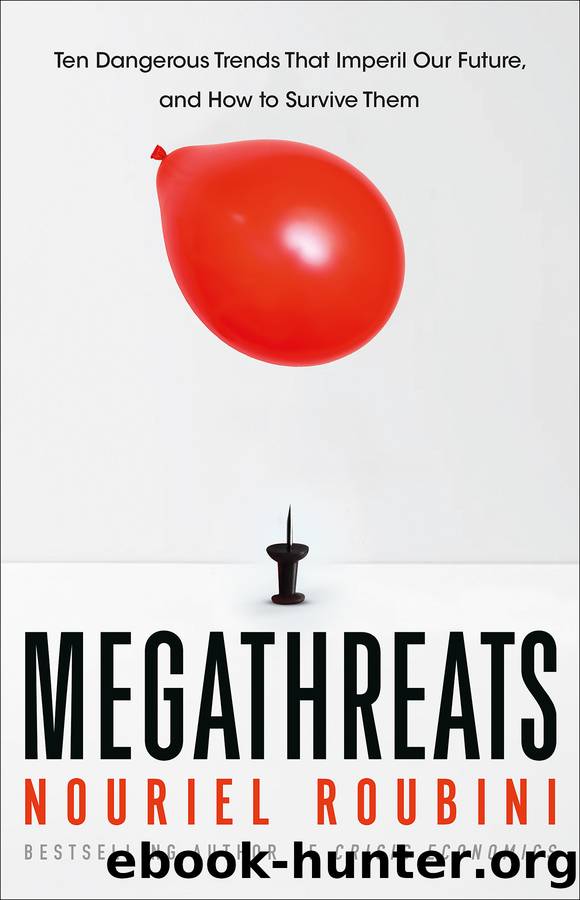Megathreats by Nouriel Roubini

Author:Nouriel Roubini [ROUBINI, NOURIEL]
Language: eng
Format: epub, mobi, azw3
Publisher: Little, Brown and Company
Published: 2022-10-18T00:00:00+00:00
No one should pretend that free trade by itself guarantees an equitable world where everyone is better off. Greater income and wealth from trade does not distribute evenly. The poor in emerging markets may see gains, but if the gap between the rich and the poor accelerates, they may feel worse off even if they are wealthier. Corporationsâincluding large multinational corporations (MNCs)âuse profits and muscle to bend rules in their favor, sometimes in anticompetitive ways. There will always be winners and losers.
Who wins? Manufacturing workers in China, Asia, and other emerging economies where incomes are rising because they have joined the global economy and their exports are growing. Skilled workers in emerging markets who can offer their services anywhere in a digital world. Very skilled workers in advanced economies who stand to gain on the strength of education and specialized experience in high value-added and tech-advanced manufacturing and service sectors. The owners of capital also benefit, especially in export sectors of advanced economies and emerging markets.
Winners also include urban and highly skilled individuals with a cosmopolitan view of society. Their mobility and flexibility give them high value as borders vanish. If trade increases the size of the overall economic pie, globalist elitesâthe top 1 percent of all owners of financial assetsâwill get even richer. And donât forget consumers. We will all pay less for cheaper goods and services.
Workers in the financial sector will reap disproportionate financial benefits. Capital mobility and financial globalization bestow ample benefits for banks and other financial institutions and investors. Rewards at the top will be lavish if not stunning. Those lower down might receive modest rewards.
Who loses when globalization prevails? Low- and medium-skill manufacturing and industrial workers in advanced economies. When cheaper goods are produced elsewhere their wages will fall. Many manufacturing jobs will vanish forever. Jettisoned workers will suffer even after adjusting for the lower cost of goods. They face transitional unemployment and a downward income spiral moving from high-paid jobs in manufacturing to lower-paid jobs in low-value-added service sectors (the âhamburger-flippingâ jobs). Globalization can pose a threat, meantime, to anyone who feels their national, ethnic, cultural, or religious identity might suffer. Rural, low-skilled workers most fear this loss of status.
Globalization and trade have hurt low-skilled blue-collar workers in advanced economies. A similar fate will increasingly hurt low- and semi-skilled white collar service workers where virtual access can substitute for physical presence. With a few months of training and no language barriers to worry about, virtual counterparts in emerging markets can fill many service jobs remotely. Middle-class security offers no refuge from competition. Call centers come to mind first, but accountants, lawyers, and even doctors may increasingly face virtual competition. Rivals in China and Asia have proliferated. Even if jobs are secure, job candidates will multiply, easing pressure on employers to raise pay. Indeed, with 2.5 billion citizens in China and India, dubbed Chindians, and many more in other emerging markets joining the global labor force, workers in advanced economies need to beware. Your paycheck and benefits are at risk.
Download
Megathreats by Nouriel Roubini.mobi
Megathreats by Nouriel Roubini.azw3
This site does not store any files on its server. We only index and link to content provided by other sites. Please contact the content providers to delete copyright contents if any and email us, we'll remove relevant links or contents immediately.
International Integration of the Brazilian Economy by Elias C. Grivoyannis(107843)
The Radium Girls by Kate Moore(12012)
Turbulence by E. J. Noyes(8015)
Nudge - Improving Decisions about Health, Wealth, and Happiness by Thaler Sunstein(7689)
The Black Swan by Nassim Nicholas Taleb(7097)
Rich Dad Poor Dad by Robert T. Kiyosaki(6596)
Pioneering Portfolio Management by David F. Swensen(6280)
Man-made Catastrophes and Risk Information Concealment by Dmitry Chernov & Didier Sornette(6001)
Zero to One by Peter Thiel(5782)
Secrecy World by Jake Bernstein(4736)
Millionaire: The Philanderer, Gambler, and Duelist Who Invented Modern Finance by Janet Gleeson(4457)
The Age of Surveillance Capitalism by Shoshana Zuboff(4272)
Skin in the Game by Nassim Nicholas Taleb(4232)
The Money Culture by Michael Lewis(4186)
Bullshit Jobs by David Graeber(4177)
Skin in the Game: Hidden Asymmetries in Daily Life by Nassim Nicholas Taleb(3986)
The Dhandho Investor by Mohnish Pabrai(3750)
The Wisdom of Finance by Mihir Desai(3726)
Blockchain Basics by Daniel Drescher(3571)
